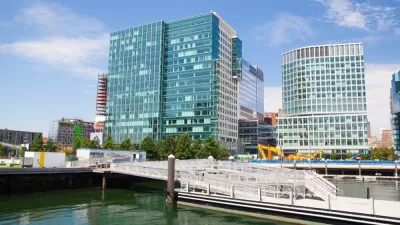Boston, like other cities around the country, suffers from a housing shortage. Initial micro-apartment developments met plenty of demand, but whether the model is a panacea for the city’s housing shortage is still in question.
Asthma Khalid examines the initial response to micro-apartments by residents of the city of Boston. The initial market for the apartments was brisk, but additional units have been slow to materialize.
Khalid quotes several knowledgeable sources in the story. First is Tom Acitelli, founding editor of the real estate blog Curbed Boston: “They got them in New York, they got them in San Francisco, they got them in Seattle. They can work here. And this sort of panacea approach that’s been offered, that they are the 21st-century solution to a city like Boston’s housing crunch is ridiculous.”
Kairos Shen, director of planning at the Boston Redevelopment Authority, also expresses hesitation that the model could solve the city’s housing shortage, but also described the units as popular among developers: “We now have lots of developers who want to develop these small units, and they’re thinking about creating micro-units, not innovation units, per se, to maximize the yield of the units that they’re able to get in a development.”
FULL STORY: Micro-Apartments: Boston’s Housing Solution Or Developers’ Cash Cow?

Planetizen Federal Action Tracker
A weekly monitor of how Trump’s orders and actions are impacting planners and planning in America.

Maui's Vacation Rental Debate Turns Ugly
Verbal attacks, misinformation campaigns and fistfights plague a high-stakes debate to convert thousands of vacation rentals into long-term housing.

Restaurant Patios Were a Pandemic Win — Why Were They so Hard to Keep?
Social distancing requirements and changes in travel patterns prompted cities to pilot new uses for street and sidewalk space. Then it got complicated.

In California Battle of Housing vs. Environment, Housing Just Won
A new state law significantly limits the power of CEQA, an environmental review law that served as a powerful tool for blocking new development.

Boulder Eliminates Parking Minimums Citywide
Officials estimate the cost of building a single underground parking space at up to $100,000.

Orange County, Florida Adopts Largest US “Sprawl Repair” Code
The ‘Orange Code’ seeks to rectify decades of sprawl-inducing, car-oriented development.
Urban Design for Planners 1: Software Tools
This six-course series explores essential urban design concepts using open source software and equips planners with the tools they need to participate fully in the urban design process.
Planning for Universal Design
Learn the tools for implementing Universal Design in planning regulations.
Heyer Gruel & Associates PA
JM Goldson LLC
Custer County Colorado
City of Camden Redevelopment Agency
City of Astoria
Transportation Research & Education Center (TREC) at Portland State University
Jefferson Parish Government
Camden Redevelopment Agency
City of Claremont





























